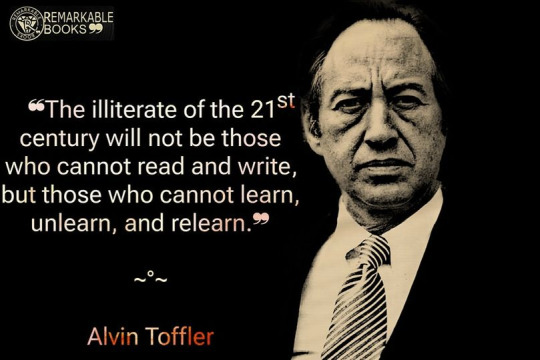#Alvin Toffler
Text
Umbrellas and automobiles are different. Not just because of size, function, and cost. But for a reason we seldom stop to consider. A person can use an umbrella without buying another product. An automobile, by contrast, is useless without fuel, oil, repair services, spare parts, not to mention streets and roads. The humble umbrella, therefore, is a rugged individual, so to speak, delivering value to its user irrespective of any other product.
The mighty auto, by contrast, is a team player completely dependent on other products. So is a razor blade, a tape recorder, a refrigerator, and thousands of other products that work only when combined with others. The television set would stare blankly into the living room if someone somewhere were not transmitting images to it. Even the lowly closet hanger presupposes a rack or bar to hang it on.
Each of these is part of a product system. It is precisely their systemic nature that is their main source of economic value. And just as "team players" must play by certain agreed-on rules, systemic products need standards to work. A three-pronged electrical plug doesn't help much if all the wall sockets have only two slots.
This distinction between stand-alone and systemic products throws revealing light on an issue that is widening today's information wars all around the world. The French call it la guerre des normes—“the war over standards." Battles over standards are raging in industries as diverse as medical technology, industrial pressure vessels, and cameras.
Alvin Toffler, Powershift: Knowledge, Wealth, and Power at the Edge of the 21st Century
#quote#Alvin Toffler#Toffler#power#powershift#technology#standards#automotive#umbrellas#systems#products#product design#industry#cars
239 notes
·
View notes
Text
the old world is dying and the new world struggles to be born. now is the time of monsters
I'm beginning to think that some massive changes have taken place not just to the world around us, but to us. How we think about people around us, how we speak, how we love, how we form thoughts, where those thoughts come from.
As much as I disagree with (at least, the surface interpretation of) Julian Jaynes' ideas about the "bicameral mind" I have to say that what I presently suspect is happening to the human mind, emotions, and cognition in the 21st century, is producing a very very different kind of character than the 20th Century Person. Possibly on the level which he believed to be the case with the shift away from his proposed Bicameral Mind.
In a way, we have a new Bicameral Mind: our native thoughts, and the distributed crowd-sourced digital brain that we have spent most of our time in interaction with since the 2010s.
Our world changed drastically and we are changing with it.
This is just my uninformed 2c, my feelings, I'm not like. A Credentialed Expert (tm) of any kind
I think that in many cases, there is a lot of artistic and intellectual work of prior to the 21st century that will be illegible to a lot of 21st Century People because the cultural context will be so drastically different and they will have no way to reach across that gap.
I genuinely believe many social concepts we grew up taking for granted - the idea of a separate self proven against the outside world, away from one's parents (in the West, this may actually be a relic of a period of time encompassing the Age of Sail and Industrial Revolution); in a community very different from oneself...
Even more, I begin to think that how *romantic love* was constructed in the 20th century, is very different now to the degree that moderns simply cannot relate to older portrayals of romance.
20th Century People can relate to the minds and feelings of 19th Century People better than 21st Century People can relate to a large cohort of 20th Century People.
It is easier for a Gen Xr to insert themselves into the mindset of a dead person living during the Great Depression than it is for a lot of Zoomers and Alphas to relate to a Gen Xr's teen years.
22 notes
·
View notes
Text

CIVANTICISM
Softhearted Compassion | Hardnosed Coherence
https://www.civanticism.com/
21 notes
·
View notes
Text
youtube
future shock 1972
the 70s were the future
12 notes
·
View notes
Quote
El cambio no solamente es necesario en la vida, es la vida en sí misma.
Alvin Toffler
#Alvin Toffler#citas#Citas en español#citas positivas#citas de motivación#citas motivacionales#motivación#motivacion#Motivacional#frases motivacionales#frases de motivacion#español#frases en español#tumblr en español#texto en español#positivo#positivismo#pensamiento positivo#frases positivas#frases
14 notes
·
View notes
Photo

14 notes
·
View notes
Text

New York Times Non-Fiction Best Sellers, 1970/12/22
#7 - Future Shock by Alvin Toffler (11 weeks on the list.)
2 notes
·
View notes
Quote
A library is a hospital for the mind.
Alvin Toffler
8 notes
·
View notes
Text
About 55 years ago a brilliant American thinker wrote.
A new civilization is emerging in our lives. This new civilization will bering with it “new family styles” ⁉️changed ways of working, loving and living, a new economy, new political conflicts, and beyond all this, an altered consciousness.
Alvin Toffler
1928-2016
What a prediction
And i have lived to see the day
#alvin toffler#living room#civilization#work#love#climate change#global#planet#earth#artificial intelligence#AI#art#man#humanity#being#spun#online#east#west#chinese#modern
1 note
·
View note
Text
Toffler didn’t actually say that this was going to happen to all of us. But I’m sure more than a few readers of Future Shock ran to the mirror, trying to assess the tech-driven damage in their own faces.
“The future invades our lives,” he claims on page one. Our bodies and minds can’t cope with this. Future shock is a “real sickness,” he insists. “It is the disease of change.”
In 1970, Alvin Toffler Predicted the Rise of Future Shock—But the Exact Opposite Happened
1 note
·
View note
Text
Futurist Alvin Toffler wrote: "The illiterate of the 21st century will not be those who cannot read and write, but those who cannot learn, unlearn, and relearn."
1 note
·
View note
Quote
You can use all the quantitative data you can get, but you still have to distrust it and use your own intelligence and judgment.
Wile E. to Calamity Coyote
0 notes
Text

Everyday Poetry - "You've got to think about big things while you're doing small things, so that all the small things go in the right direction." Alvin Toffler
85 notes
·
View notes
Text
The Circular Flow diagram depicted labour appearing—hey presto!—fresh and ready for work each day at the office or factory door. So who cooked, cleaned up, and cleared away to make that possible? When Adam Smith, extolling the power of the market, noted that it is not from the benevolence of the butcher, the brewer, or the baker that we expect our dinner, he forgot to mention the benevolence of his mother, Margaret Douglas, who had raised her boy alone from birth. Smith never married, so had no wife to rely upon (nor children of his own to raise). At the age of 43, as he began to write his opus, The Wealth of Nations, he moved back in with his cherished old mum, from whom he could expect his dinner every day. But her role in it all never got a mention in his economic theory, and it subsequently remained invisible for centuries.
As a result, mainstream economic theory is obsessed with the productivity of waged labour while skipping right over the unpaid work that makes it all possible, as feminist economists have made clear for decades. That work is known by many names: unpaid caring work, the reproductive economy, the love economy, the second economy. However, as economist Neva Goodwin has pointed out, far from being secondary, it is actually the ‘core economy,’ and it comes first every day, sustaining the essentials of family and social life with the universal human resources of time, knowledge, skill, care, empathy, teaching and reciprocity. And if you have never really thought of it before, then it's time you met your inner housewife (because we all have one). She lives in the daily dealings of making breakfast, washing the dishes, tidying the house, shopping for groceries, teaching the children to walk and to share, washing clothes, caring for elderly parents, emptying the rubbish bins, collecting kids from school, helping the neighbours, making the dinner, sweeping the floor and lending an ear. She carries out all those tasks—some with open arms, others through gritted teeth—that underpin personal and family well-being and sustain social life.
We all have a hand in this core economy, but some people (like Adam Smiths mum) spend far more time in it than others. Time may be a universal human resource, but it varies hugely in terms of how we each get to experience and use it, how far we control it, and how it is valued. In sub-Saharan Africa and South Asia, time spent in the core economy is particularly visible because, when the state fails to deliver and the market is out of reach, householders have to make provision for many more of their needs directly. Millions of women and girls spend hours walking miles each day, carrying their body weight in water, food or firewood on their heads, often with a baby strapped to their back—and all for no pay. But this gendered division of paid and unpaid work is prevalent in every society, albeit sometimes less visibly so. And since work in the core economy is unpaid, it is routinely undervalued and exploited, generating lifelong inequalities in social standing, job opportunities, income and power between women and men.
By largely ignoring the core economy, mainstream economics has also overlooked just how much the paid economy depends upon it. Without all that cooking, washing, nursing and sweeping, there would be no workers—today or in the future—who were healthy, well-fed and ready for work each morning. As the futurist Alvin Toffler liked to ask at smart gatherings of business executives, ‘How productive would your workforce be if it hadn't been toilet trained?’ The scale of the core economy's contribution is not to be dismissed lightly, either. In a 2002 study of Basle, a wealthy Swiss city, the estimated value of unpaid care being provided in the city's households exceeded the total cost of salaries paid in all of Basle's hospitals, day care centers and schools, from the directors to the janitors. Likewise, a 2014 survey of 15,000 mothers in the United States calculated that, if women were paid the going hourly rate for each of their roles—switching between housekeeper and daycare teacher to van driver and cleaner—then stay-at-home mums would earn around $120,000 each year. Even mothers who do head out to work each day would earn an extra $70,000 on top of the actual wages, given all the unpaid care they also provide at home.
Why does it matter that this core economy should be visible in economics? Because the household provision of care is essential for human well-being, and producivity in the paid economy depends directly upon it. It matters because when—in the name of austerty and public sector savings—governments cut budgets for children's daycare centres, community services, parental leave and youth clubs, the need for care-giving doesn't disappear: it just gets pushed back into the home. The pressure, particularly on women's time, can force them out of work and increase social stress and vulnerability. That undermines both well-being and women's empowerment, with multiple knock-on effects for society and the economy alike. In short, including the household economy in the new diagram of the macroeconomy is the first step in recognising its centrality, and in reducing and redistributing women's unpaid work.
-Kate Raworth, Doughnut Economics: Seven Ways to Think Like a 21st Century Economist
42 notes
·
View notes
